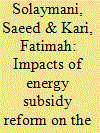| Srl | Item |
| 1 |
ID:
132762


|
|
|
|
|
| Publication |
2014.
|
| Summary/Abstract |
Malaysia is paying a high level of subsidies on the consumption of energy (about 5% of its GDP). Therefore, reforming the energy subsidies, as planned by the government, will have a significant impact on household welfare and energy-intensive sectors, such as the transport sector. This study employs a computable general equilibrium (CGE) model to highlight the transmission channels through which the removal of energy subsidies affects the domestic economy. The findings show that the shock increases real GDP and real investment, while decreasing Malaysian total exports and imports. The removal of energy subsidies also decreases the aggregate energy demand, and, consequently, decreases the level of carbon emissions in the Malaysian economy. In addition, households experience significant falls in their consumption and welfare. The transport sector is significantly influenced through an increase in production costs due to an increase in the prices of intermediate inputs. The total output and total exports of the whole transport sector decrease while its imports increase. In addition, the use of all kinds of transport by households decreases significantly. The Malaysian energy subsidy reform, leads to an initial decrease in CO2 emissions and demand for electricity, gas, and petroleum products in the entire transport sector.
|
|
|
|
|
|
|
|
|
|
|
|
|
|
|
|
| 2 |
ID:
160816


|
|
|
|
|
| Summary/Abstract |
This study uses a computable general equilibrium approach to investigate the impact of high global food and agricultural commodity prices and two mitigation options (a rise in agricultural input subsidies and an improvement in agricultural productivity) on poverty and economic performance of Malaysia. Simulated results showed that, as a whole, the high global food price has a negative impact on the economic growth of Malaysia. It decreases real gross domestic product of Malaysia by 0.53%. Although the food price hike initially increases poverty in urban areas, it would significantly decrease the poverty of rural and noncitizen households. However, both mitigation options can reduce the negative impact of the shock on the poverty and economic growth of Malaysia. The agricultural subsidy rise option cannot reduce the poverty level of all household groups, whereas the productivity improvement option can alleviate the poverty level of all household groups. In conclusion, results suggest that the agricultural productivity improvement option is more effective than the agricultural subsidy rise option to mitigate the negative impact of global food price shocks on the economy and poverty of Malaysia.
|
|
|
|
|
|
|
|
|
|
|
|
|
|
|
|